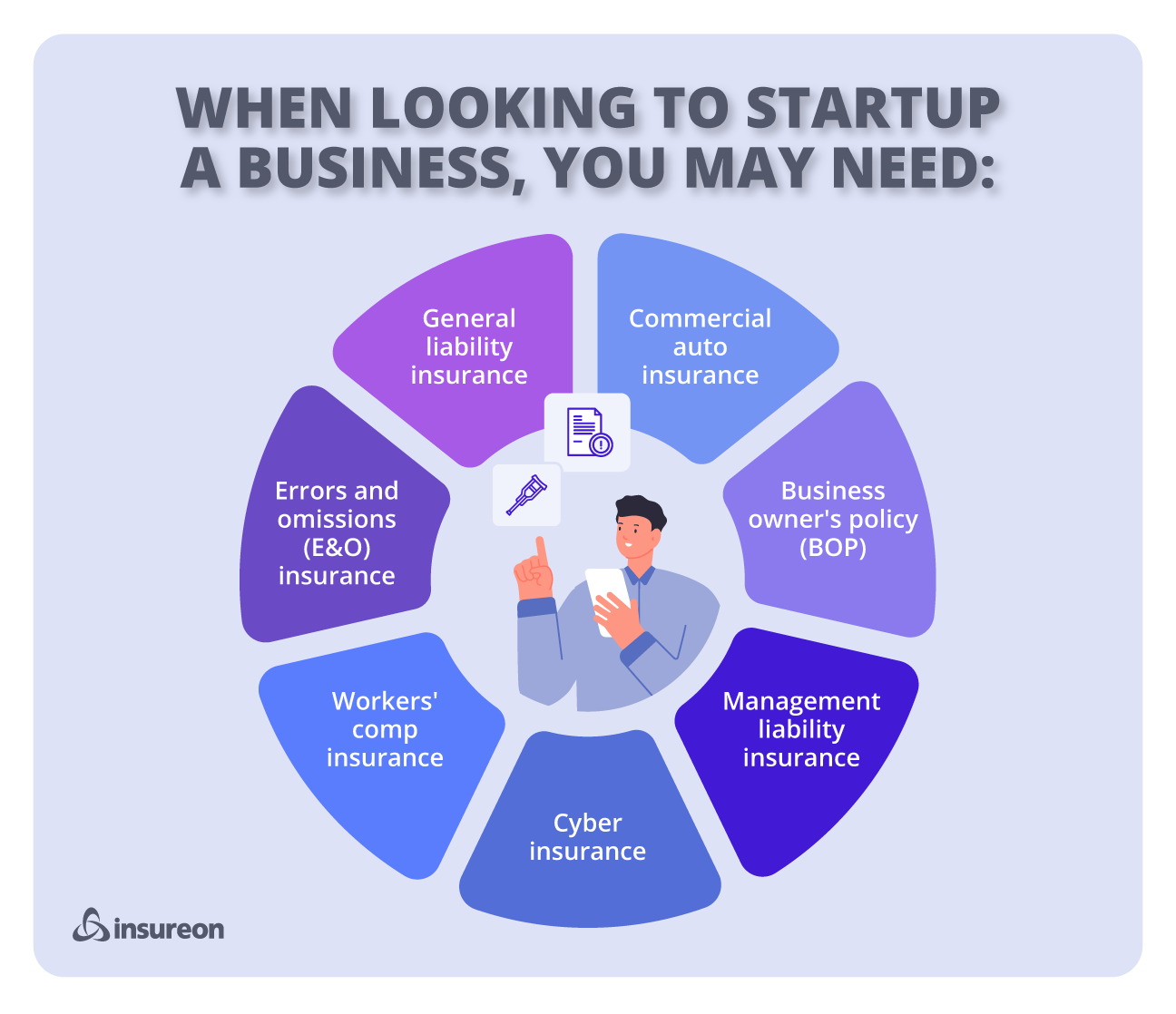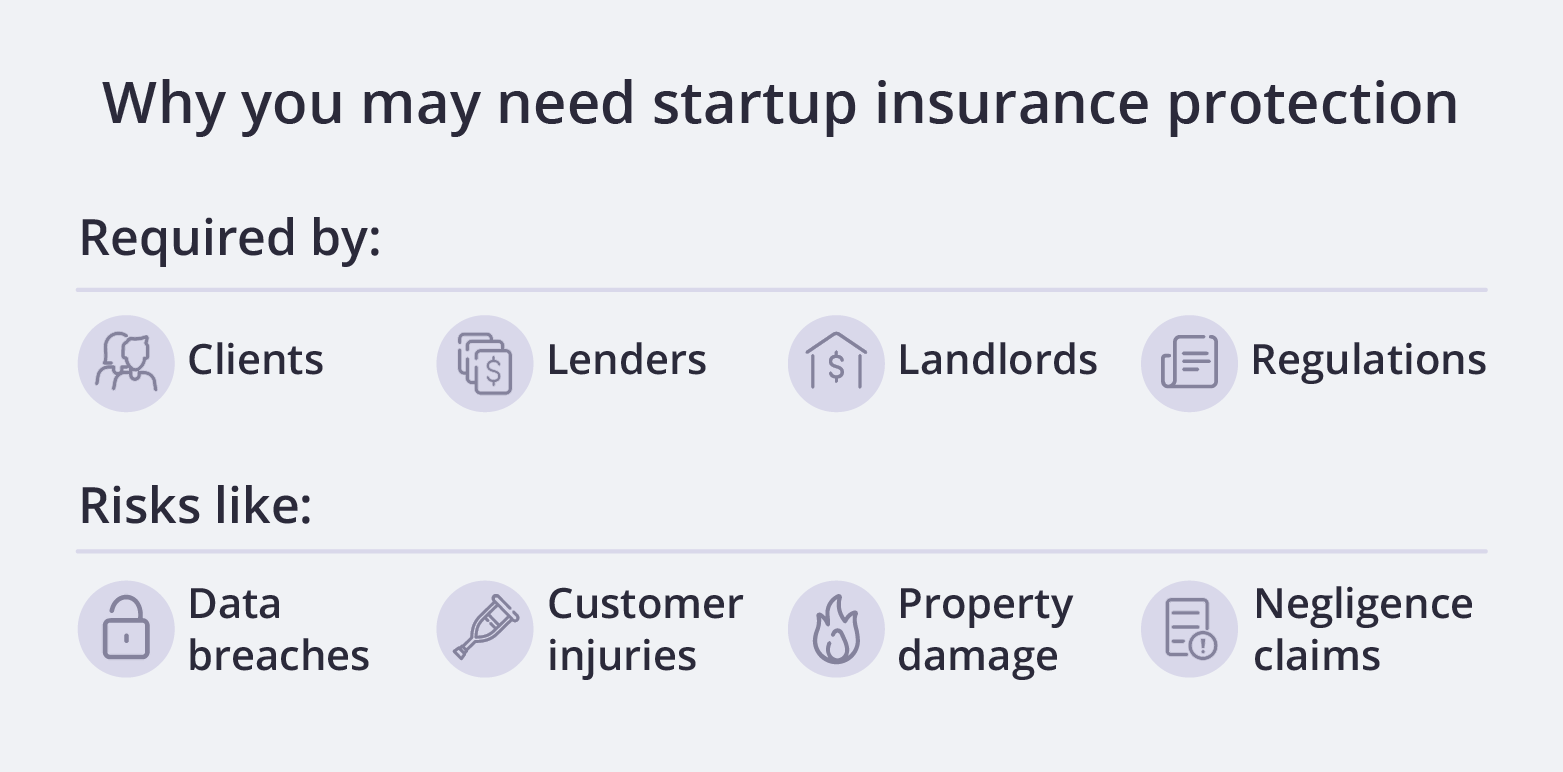
Why do startups need insurance?
Startups face many of the same risks as bigger businesses, but with fewer resources to handle an accident or lawsuit. Business insurance protects your growing company from legal fees, costly repairs, and medical expenses.
What types of business insurance do startups need?
These insurance policies cover common risks faced by startups.
General liability insurance
General liability insurance covers the cost of third-party accidents, such as a client who trips and suffers a bodily injury at your office. It may be required for a commercial lease.
- Slip-and-fall accidents
- Accidents that damage client property
- Product liability insurance
Errors and omissions insurance
E&O insurance protects startups who offer professional services from financial losses related to mistakes and oversights. It's sometimes referred to as professional liability insurance.
- Errors that cause a client to lose money
- Accusations of negligence
- Missed deadlines
Workers' compensation insurance
Workers’ comp shields startups from work-related medical bills that health insurance might deny. Most states require it for businesses with employees.
- Work-related medical expenses
- Disability benefits
- Lawsuits from employee injuries
Cyber insurance
This type of coverage helps startups recover from data breaches and cyberattacks. It's strongly recommended for any small business that handles credit cards or other personal data.
- Data breach notification costs
- Data breach investigations
- PR costs for reputational harm
Commercial property insurance
This policy covers costs when a startup's business property is damaged, destroyed, or stolen. You can combine it with general liability insurance in a BOP for a discount.
- Fires
- Storm damage
- Theft of expensive equipment
Business owner's policy
A BOP bundles general liability coverage and commercial property insurance at a discount. It protects against the most common lawsuits and business property damage.
- Accidents that harm clients
- Stolen or damaged business property
- Business interruption insurance
Employment practices liability insurance
EPLI insurance coverage helps pay for legal expenses when an employee sues your startup for discrimination, harassment, wrongful termination, or a similar employment issue.
- Wrongful termination claims
- Discrimination claims
- Other violations of employee rights
Directors and officers insurance
D&O insurance covers lawsuits related to decisions made by officers and board members on behalf of your startup, including lawsuits from dissatisfied investors.
- Lack of transparency
- Mismanaged funds
- Failure to comply with regulations
Commercial auto insurance
This policy covers costs when a vehicle owned by a startup is involved in an accident. Each state has its own requirements for auto liability insurance.
- Auto accident injuries
- Property damage caused by your vehicle
- Vehicle theft and vandalism

How much does business insurance cost for startups?

Startups often qualify for discounts on business insurance. Factors that affect your premium include your profession, business location, and the policy's limits and deductible.
Here are the average costs for top insurance policies sold by Insureon:
General liability insurance: $42 per month
Professional liability: $61 per month
Workers' comp: $45 per month
Verified business insurance reviews
Hear from customers like you who purchased small business insurance.
State insurance requirements
Find business insurance requirements in your state

Find the right business insurance coverage for your startup
[video: an illustrated header displays the Insureon logo and the text: "What insurance do I need for my startup business?"]
NARRATOR: Starting a business often comes with the same or even greater risks that bigger, established businesses face. But having the right insurance coverage will protect your business from costly legal fees, repairs, and medical expenses.
There are several insurance policies you can carry that offer valuable peace of mind, and safeguard your new business.
General liability insurance covers third-party accidents, such as customer injuries or property damage.
[video: an illustrated header displays the text: "General liability covers: Slip-and-fall accidents; Client property damage; Product liability lawsuits"]
Commercial property insurance covers costs if your business property is damaged, destroyed, or stolen.
[video: an illustrated header displays the text: "Commercial property covers: Fires; Storm damage; Equipment theft"]
A business owner's policy, or BOP, bundles general liability and commercial property coverage together. It typically costs less than buying both of these policies separately.
[video: an illustrated header displays the text: "A BOP covers: Client accidents; Stolen or damaged property; Business interruptions"]
Errors and omissions insurance will protect your business from lawsuits related to work mistakes and oversights. This policy is also referred to as professional liability insurance.
[video: an illustrated header displays the text: "Errors and omissions (E&O) covers: Accusations of negligence; Missed deadlines; Errors that cost clients money"]
Cyber Insurance can help your business financially recover from data breaches and cyberattacks.
[video: an illustrated header displays the text: "Cyber insurance covers: Data breach notification costs; Data breach investigations; PR costs for reputational harm"]
Workers compensation insurance is required in most states and can shield your startup from work-related medical costs.
[video: an illustrated header displays the text: "Workers' comp covers: Work-related medical expenses; Disability benefits; Lawsuits from employee injuries"]
Commercial auto insurance protects your business from auto accidents involving company-owned vehicles.
[video: an illustrated header displays the text: "Commercial auto covers: Auto accident injuries; Property damage caused by vehicles; Vehicle theft and vandalism"]
Employment practices liability insurance helps pay for legal expenses if an employee sues your startup for discrimination, harassment, or wrongful termination.
[video: an illustrated header displays the text: "Employment practices liability covers: Wrongful termination claims; Discrimination lawsuits; Other violations of employee rights"]
Directors and officers insurance covers lawsuits related to decisions made by officers and board members on behalf of your startup.
[video: an illustrated header displays the text: "Directors and officers insurance covers: Lack of transparency; Mismanaged funds; Failure to comply with regulations"]
So, why is it important for you to have insurance for your startup?
[video: an illustrated header displays the text: "Why is insurance important for a startup?"]
You may need coverage to sign a contract or lease. You also might need insurance to comply with federal, state, and local laws.
[video: an illustrated header displays the text: "Startups may need insurance to: Sign a contract or lease; Apply for a loan; Comply with federal or state laws"]
Additionally, insurance protects your startup from catastrophic losses that could shutter your business. Plus, the right coverage can help you gain client trust, as well as attract top talent to your startup.
[video: an illustrated header displays the text: "Insurance can also help: During business closures; Gain client trust; Attract talent"]
Get the best coverage for your startup with Insureon today. Click the link to get started.
[video: an illustrated header displays the text: "Insureon is your #1 agency for small business insurance"]
[video: an illustrated header displays the Insureon logo]
Common questions about business insurance for startups
Why is insurance important for startups?
Here are a few reasons why insurance is crucial for startups, sole proprietors, independent contractors, and other small business structures.
You may need insurance coverage to sign a contract or a lease. Clients and landlords may require you to carry insurance to protect themselves against potential losses. In some cases, they may ask you to list them as an additional insured on your policy.
You may need insurance to comply with the law. Depending on the laws in your state, you may need coverage for a business-owned vehicle, to obtain a license in your field, or to protect against work-related injuries.
Insurance protects your startup from catastrophic losses. Insurance gives entrepreneurs peace of mind knowing they’re protected financially against customer accidents, fires, and other incidents that might otherwise prove devastating.
You gain client trust by being insured. Even when it's not required, a certificate of insurance proves that your business can handle the cost of a lawsuit or accident, which can help attract clients.
Insurance can help secure top talent. D&O insurance for startups affords protection to board members and directors for their decisions, which can help attract experts to the positions.

How do I get a certificate of insurance?
With Insureon, small business owners can usually get a certificate of insurance on the same day that you apply for quotes. It’s a simple three-step process:
- Fill out our easy online application.
- Compare free quotes from top-rated insurance providers.
- Buy a policy and download a certificate of insurance.
A certificate of insurance will outline the details of your business liability insurance, such as policy limits, deductibles, and any endorsements. It serves as proof of insurance for clients, landlords, lenders, and anyone else who asks whether your business is insured.
How can I save money on business insurance?
Commercial insurance is usually affordable for startups and low-risk small businesses. There are a few ways to find cheaper insurance:
Compare quotes. With Insureon, you will instantly get multiple free online quotes from leading insurance companies. Compare insurance options from different providers and consult with our agents to make sure you're not paying too much for insurance while getting what's best for your startup business.
Bundle policies. Startup founders can often buy general liability coverage and commercial property insurance together in a business owner's policy, which costs less than purchasing each policy separately. A tech E&O policy can also save you money on cyber insurance and E&O insurance.
Choose a high deductible. You can customize your insurance policy to save money, such as by choosing a higher deductible or lower policy limits.
Avoid claims. Finally, take steps to reduce your business's risks. Prompt cleanup of spills, the elimination of clutter, and bright lighting can help your business avoid accidents and subsequent liability claims, which helps keep your premiums low.
Does my profession affect what type of insurance I need?
Yes, the type of work you do affects your insurance needs.
Tech startups should carry technology errors and omissions insurance (tech E&O), which bundles protection against cyber risks and professional mistakes.
The laws in your state may also require you to carry a liability policy, depending on your field.
Whether you're looking to start an IT services business or currently own a tech company or other kind of startup, insurance is a crucial part of risk management. It may take a little research to find out what type of business insurance you need, or a licensed insurance agent can help you find the right coverage.
What other types of coverage do startups need?
The policies you need depend on the specifics of your business, such as whether you drive for work or have a client who requires a certain type of coverage.
Other insurance policies you may need include:
Hired and non-owned auto insurance: An HNOA policy provides liability protection when startup owners or employees drive their own vehicle for work. It also covers leased and rented vehicles.
Commercial crime insurance: Crime insurance, such as a fidelity bond, can reimburse clients for employee theft, including electronic funds transfer. It may be required by a client contract.
Key man insurance: Key man insurance pays out benefits to the business in order to stay operational if a key business leader, such as an executive or CEO, passes away unexpectedly.

























